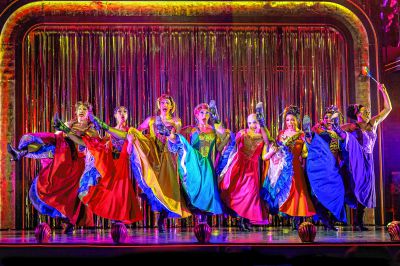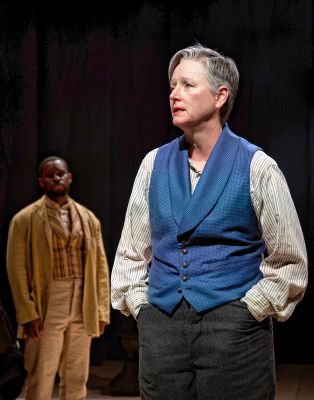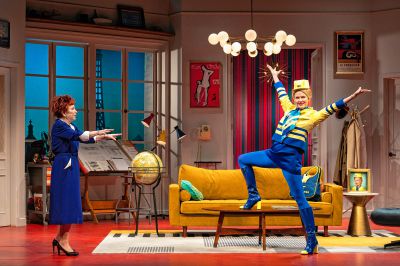By Jarice Hanson
For the Valley Advocate
This summer three outstanding shows in the Berkshires demonstrate that the performativity of gender has broken free from traditional gender-based casting in some places. In this edition of Theater Matters, we explore how some theaters have been breathing new life into old theatrical hits this summer.
Barrington Stage’s ‘La Cage aux Folles’
In launching its 30th season, Barrington Stage Company made a wise choice to present “La Cage aux Folles.” Running from June 11 to July 6, this production still reflected the question of who can be a family, but in updating the Cagelles — the dancers — to include messages of body acceptance and presentation of self, the message comes, as one character says “on an angle.”

CONTRIBUTED
In launching its 30th season, Barrington Stage Company made a wise choice to present “La Cage aux Folles,” which ran from June 11 to July 6.
Directed by Mike Donahue and choreographed by Paul McGill, who played a Cagelle in an earlier Broadway production, and staring Alex Michaels as Albin, a drag performer who also performs as Alexis Michelle. Some may be familiar with her performances on the hit show, “RuPaul’s Drag Race.”
When “La Cage” opened on Broadway in 1983 with a book by a young Harvey Fierstein and poignant lyrics by Jerry Herman, the show’s purpose was to show a loving relationship between two men, described by the character Georges as: “one transvestite, and one regular homosexual.” Subsequent Broadway revivals in 2005 and 2010 experimented with different subtexts, but in the Barrington version, the elevation of drag as an art form was obviously an intentional theme.
In this interpretation, the Cagelles expressed joy in the most physical of terms. They jumped in can-can skirts to land in splits, they tumbled and flipped, they did acrobatic ballet numbers and strutted in heels so high they made my calves hurt. Two scenes developed for this production specifically underscored the beauty of the body. In another added scene, we saw the Cagelles in their male personas, looking rough, ragged, and a little bit like ruffians awaiting clearance at a police station. It’s a short scene, but oh, so powerful!
These Cagelles were comfortable in their bodies, which made Zaza, the star performer (and drag artist Michelle) even more glorious than in past productions. Kudos to Rodrigo Muñoz and Benjamin Weigel for their co-designing of the costumes, and Bobbie Zlotnik’s hair and wig design. Kyle Krueger’s makeup design also contributed to the beauty and gender fluidity that underscores one of the musical descriptions of the denizens of the night club as “bawdy and bizarre.” All in all, a wonderful start to BSC’s 30th anniversary season.
Another excellent production this summer was Berkshire Theater Group’s revival of the 1938 play, “Abe Lincoln in Ilinois,” which ran from June 13 to July 14 at BTG’s Unicorn Theater. In three acts and spanning three hours (which seemingly flew by), Robert E. Sherwood’s 1938 play was updated: two of the three actors portraying Lincoln were Black, and the third identifies as gender-fluid.
The show started with a spotlight on a tall top hat, positioned center stage. In the first act, young Abe Lincoln, played with midwestern innocence by Brandon Dial, struggled with getting an education. Portrayed as an “everyman,” he is counseled to either “go into teaching or politics, because you don’t need to know anything” in those fields.
At the start of the second act, Dial hands the hat to middle-aged Abe, played by Kelli Simpkins, who delivers Lincoln’s humorous stories so beautifully. The commitment this role required really showcased Simpkins’ acting chops and we, the audience, easily go along with the presentation of Abe in a body that may challenge expectations.

CONTRIBUTED
Another excellent production this summer was Berkshire Theater Group’s revival of the 1938 play, “Abe Lincoln in Ilinois,” which ran from June 13 to July 14 at BTG’s Unicorn Theater.
In the third act, the symbolic top hat is passed to older Abe, the one we are most familiar with. McKay gives a heartbreaking performance when he utters the words Lincoln spoke to the people of Illinois upon leaving home to become president. The ensemble of actors move from character to character, with no references to race and gender. Men play women, women play men. Black actors play white historical characters.
Director David Auburn wove the different characters into situations that were so relatable and so real, it was impossible to miss the extraordinarily high stakes of the pre-Civil War United States. The tapestry that evolved with this casting and the extraordinary words that led us to be a “more perfect union” left an indelible mark on the audience.
The creativity and commitment demonstrated in this production perfectly summed up the challenges of leadership in a society where being different from one and other is not bad, but rather, a strength. With this production, BTG shows that with the right talent and total commitment from an ensemble, both gender and race can be portrayed with universal appeal and believability.
Frankly, I didn’t think they could do it!
I have always thought that French playwright Marc Camoletti’s “Boeing Boeing” exploited unflattering stereotypical portrayals of 1960s women as bimbos. I’ve seen many productions that were so derogatory toward women, it would make me grind my teeth. In Barrington Stage Company’s version that ran from July 17 to August 3, the women, typically portrayed as sexy excuses for men behaving badly, was markedly changed. These women had the sensibilities and power of today’s woman.
A classic French farce with split-second timing, directed brilliantly by Julianne Boyd with BSC Associate Artists Mark H. Dold as Robert, Christopher Innvar as Bernard, and Debra Jo Rupp as Berthe, the exasperated maid, provided big, non-stop laughs.
In this production the three fiancées of Bernard are fully fleshed out. They are strong women with minds of their own. Oh what a happy updating of a story that grew from 1960s toxic male dominance to full gender parity!

CONTRIBUTED
In Barrington Stage Company’s version that ran from July 17 to August 3, the women, typically portrayed as sexy excuses for men behaving badly, was markedly changed. These women had the sensibilities and power of today’s woman.
Actresses playing the three stewardesses, all engaged to Bernard but unaware of his infidelity, each brought fresh interpretations to their characters and still stayed true to the gender assumptions that made this show an international hit for the last 60 years. Yes, each one is beautiful, leggy, and oozing sex appeal, but each of these women demonstrated an inner strength that shows that the 1960s double entendre “fly me” ad campaign is a thing of the past.
We first met Gloria, the American, played by Gisela Chipe, who infused her character with energy that would intimidate any man. Next came the Italian, Gabriella, played by the sultry, smokey voiced Stephanie Jean Lane. She is today’s Italian woman, demanding and deserving of being worshiped. Finally, Gretchen, the German, hilariously interpreted by the statuesque Kate MacCluggage, who used her height and a low, guttural voice to make her demands. Her scenes with Mark H. Dold, playing Bernard’s nerdy American friend Robert, provided some of the best laughs. They epitomized gender power struggles that made this new interpretation refreshingly funny and particularly laudable.
The ensemble nature of this production shows once again that good scripts in the hands of creative, talented people who are totally committed to telling stories in new ways, can mark the passage of time, social values, and gender assumptions.
A new twist on ‘King Lear’
I can’t close without a particular shout out to Real Live Theater, based in the Valley, for their six-year-long collaboration resulting in a thoughtful, entertaining, but very serious production of “When the Mind’s Free,” a story about aging, Alzheimer’s disease, addiction, and the challenges for caregivers to do what’s best for their loved ones.
Loosely based on “King Lear,” the three daughters represent different perspectives on watching their two mothers deal with one’s descent into Alzheimer’s.
Directed by Toby Vera Bercovici, this show featured a stellar cast and original music and choreography. This show is an example of theater drawing from work in memory studies, caregiving, and loss. While the production at the Shea Theater closed Aug. 4, you can look for future special productions in various locations throughout the Valley.


